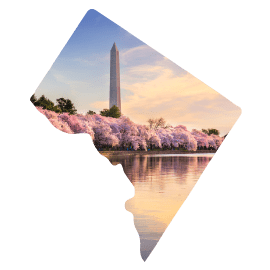Licensure Reciprocity: District of Columbia
Expanding the Pool of Teachers Policy
Analysis of District of Columbia's policies
The District of Columbia does not support licensure reciprocity for certified teachers from other states.
Regrettably, the District grants a waiver for its licensing tests to any out-of-state teacher who has at least three years of experience.
Teachers with out-of-state certificates are eligible for a District of Columbia full license by meeting all of the following conditions: completion of a state-approved preparation program, possession of a valid level II license and completion of three years of full-time teaching experience—all in the relevant licensure subject area.
Although there is no state-mandated recency requirement for the professional certificate, candidates who do not meet the three conditions outlined above are given a transcript analysis of their credentials, which may result in the requirement of additional coursework and/or state tests.
Recommendations for District of Columbia
To uphold standards, require that teachers coming from other states meet testing requirements.
The District of Columbia takes considerable risk by granting a waiver for its licensing tests to any out-of-state teacher who has three years of teaching experience. It should not provide any waivers of its teacher tests unless an applicant can provide evidence of a passing score under its own standards. The negative impact on student learning stemming from a teacher's inadequate subject-matter knowledge is not mitigated by the teacher's having recent experience.
Offer a standard license to certified out-of-state teachers, absent unnecessary requirements.
The District of Columbia should reconsider its requirement regarding experience, as it may deter talented teachers from applying for certification. In addition, transcript analysis is likely to result in additional coursework requirements, even for traditionally prepared teachers; alternate route teachers, on the other hand, may have to virtually begin anew, repeating some, most or all of a teacher preparation program.
Accord the same license to out-of-state alternate route teachers as would be accorded to traditionally prepared teachers.
Regardless of whether a teacher was prepared through a traditional or alternate route, all certified out-of-state teachers should receive equal treatment. State policies that discriminate against teachers who were prepared in an alternate route are not supported by evidence. In fact, a substantial body of research has failed to discern differences in effectiveness between alternate and traditional route teachers.
State response to our analysis
The District of Columbia was helpful in providing NCTQ with the facts necessary for this analysis. The District added that it only conducts transcript analyses for candidates who did not complete a state-approved licensure program.
Select another topic
Delivering Well Prepared Teachers
- Admission into Preparation Programs
- Elementary Teacher Preparation
- Elementary Teacher Preparation in Reading Instruction
- Elementary Teacher Preparation in Mathematics
- Middle School Teacher Preparation
- Secondary Teacher Preparation
- Secondary Teacher Preparation in Science
- Secondary Teacher Preparation in Social Studies
- Special Education Teacher Preparation
- Assessing Professional Knowledge
- Student Teaching
- Teacher Preparation Program Accountability
Expanding the Pool of Teachers
Identifying Effective Teachers
- State Data Systems
- Evaluation of Effectiveness
- Frequency of Evaluations
- Tenure
- Licensure Advancement
- Equitable Distribution
Retaining Effective Teachers
Exiting Ineffective Teachers
Research rationale
http://www.ncbex.org/ .

